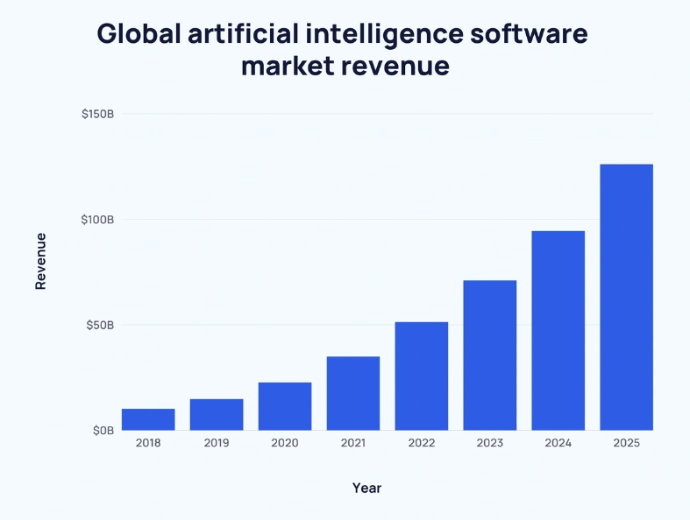Artificial Intelligence
(AI) has become a game-changer, revolutionizing industries across the globe
with its data-powered efficiency and remarkable capabilities. In this article,
we explore the significant impact of AI-driven advancements and their
transformative potential across various industries.
The global AI market is expected to reach $1.81 trillion by 2030.

While the current AI market is sizeable, it's set to grow by over 13x over the next decade or so. During this forecast period, the AI market is predicted to increase by a CAGR of 38.1%.
AI in Industries: Analyzing the Impact
Leveraging Data for Informed Decision Making
One of the most significant advantages of AI lies in its ability to swiftly and accurately process vast amounts of data, empowering industries to make informed decisions. This data-driven approach leads to optimized strategies and enhanced performance, resulting in a 50% reduction in errors and a 30% increase in productivity for businesses that adopt AI-driven decision making.
Streamlining Processes through Automation
AI-powered automation is revolutionizing processes in multiple sectors, driving increased efficiency and reduced operational costs. From manufacturing to customer service, AI-driven automation frees up human resources to focus on more strategic tasks. As a result, industries implementing AI automation can achieve cost savings of up to 20% within the first year.
Personalization for Enhanced Customer Experience
Customer-facing industries are benefiting from the integration of AI, transforming the way companies interact with their clients. AI-driven algorithms analyze customer preferences and behaviors, enabling businesses to offer personalized products and services. This heightened level of personalization leads to a 35% increase in customer retention rates through AI-enabled strategies.
Addressing Challenges and Exploring Opportunities
Data Privacy and Security
While AI offers immense potential, concerns about data privacy and security are major challenges that need to be addressed. Implementing robust data protection measures is crucial to safeguard sensitive information and ensure the widespread acceptance of AI-driven solutions.
Adapting to Workforce Changes
AI's potential for increased efficiency also raises concerns about job displacement due to automation. Organizations must invest in reskilling and upskilling initiatives to equip their employees with the necessary skills to work alongside AI technologies seamlessly.
AI's Transformative Potential
Revolutionizing Healthcare and Medical Advancements
The healthcare sector stands to gain significantly from AI-driven advancements. AI-powered diagnostic tools and predictive analytics can help medical professionals make more accurate diagnoses and personalized treatment plans, reducing diagnostic errors by up to 40% and potentially saving millions of lives.
Optimizing Supply Chain Management
AI-driven optimization in supply chain management can lead to improved inventory management, demand forecasting, and logistics. This results in reduced operational costs and minimized delays, ensuring a smoother and more efficient supply chain process with a potential 20% cost reduction.
Addressing Ethical Concerns
Striking a Balance
As AI's usage expands, ethical concerns related to autonomous vehicles and AI-powered weaponry emerge. Striking a balance between technological advancement and ethical considerations remains a challenge for industries and policymakers.
Emphasizing Human Oversight
While AI enhances decision-making processes, careful consideration of human oversight is essential in critical situations. Industries must assess where human intervention is necessary, ensuring a healthy synergy between AI and human intelligence.
Conclusion
In conclusion, AI-driven advancements are transforming industries with
their data-powered efficiency and capabilities. By leveraging AI responsibly
and addressing challenges such as data privacy, workforce changes, and ethical
dilemmas, industries can shape a future where technology and humanity coexist
harmoniously, driving progress and prosperity for all.
